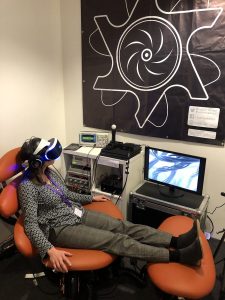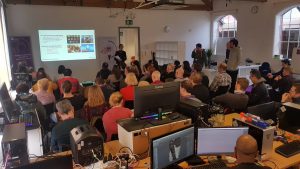
On a cold January morning we made our way through Millennium Square’s Winter Fair and up the industrial metal spiral staircase to the welcoming space of the Bristol VR Lab. Bristol VR lab is a workspace shared by residents who develop and research virtual, augmented and mixed reality technology, applications and projects made up of people from across the South West. The Jean Golding Institute have formed a collaboration with Bristol VR Lab as well as We The Curious to facilitate the development of a data visualisation project.
Our visit to Bristol VR Lab was for a workshop to introduce University of Bristol researchers who have large datasets to virtual reality / augmented reality experts in order for them to form teams and apply for the prize of £8,000 and the chance to work within the Bristol VR Lab and have their work shown at the Data Dome in We The Curious and at the JGI Showcase on 3 July 2018.
The day started with Kate Robson Brown, JGI Director and Patty Holley, JGI Manager who were both thrilled to be introducing the day and to be involved in an initiative with many new faces. They introduced the format for the day, which included a short presentation from each of the 9 University of Bristol researchers who have datasets, and after lunch all the VR / AR experts had a chance to talk to all the researchers about their datasets and discuss how they would anticipate working with them on such a project.
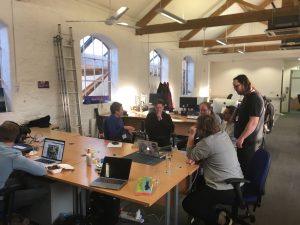
Seamus Foley, Digital Producer at We The Curious spoke about how they could support the project and about how the goals of We The Curious have evolved from their @Bristol days where they worked to enable science to become more accessible, to now be interested in sparking people’s curiosity, in the wider sense in their updated vision of ‘We The Curious’. Ben Trewhella, CEO at Opposable Group and part of Bristol VR Lab provided information about the space that will be available to the winner of the challenge and how they will have access to expert help in Bristol VR Lab.
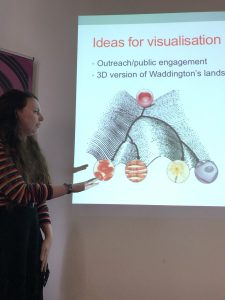
The datasets presented were:
- ‘The Virtual Fish’ Chrissy Hammond gave an animated talk about how she was looking to develop a visualisation of the data collected from zebrafish and her work on skeletal diseases.
- ‘Using virtual reality as a tool to explore nanoscale phenomena’ was presented by Freddie Russell-Pavier, Oliver Payton and Namid Shatil who would like to be able to visualise how small, small things are.
- ‘Global atmospheric methane simulation’ was presented by Angharad Stell, a PhD candidate, who demonstrated the aspects that cause methane emissions around the globe and how she would like to see this visualised.
- ‘Associations between primary care antibiotic prescribing and antimicrobial resistance E Coli causing UTIs’ was presented by Ashley Hammond where she highlighted the global issue of antibiotic resistance and how the geographical distribution could be visualised in an interactive map and be useful both for clinicians and to provide awareness to the public.
- ‘3D High resolution brain MRI’ Jade Thai enthused about her Functional MRIs of patients with conditions like Chronic Fatigue Syndrome (CFS) and Myalgic Encephalopathy (ME) and is keen to have the opportunity to be able to ‘visualise the brain in action.’
- ‘Uncovering Greenland’s hidden landscape’ is Jonathan Bamber’s project based on 20 years of data collection from NASA and UKRCs. He showed us paper maps and other visualisations of sea level rise as a consequence of global warming but would really like to be able to have a VR walk through.
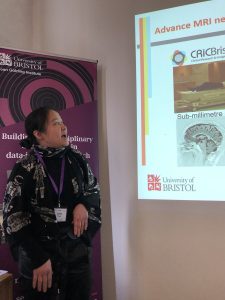
Jade Thai, 3D High resolution brain MRI - ‘Visualising big data to make extraordinary discoveries about human health and disease’ Oliver Davies presented on behalf of the MRC IEU where they use big data to understand human disease.
- ‘Interactive protein-protein docking using VR’ was presented by Richard Sessions who is interested in how proteins interact with each other and is keen to develop a 3D game, matching proteins which could not only be useful for scientists developing machine learning approaches to protein-protein docking but also might appeal to the public.
- ‘Exploring Waddington’s landscape in 3D’ The final talk of the morning by another PhD student, Natalie Thurlby, was concerning how cells differentiate and the potential for developing a 3D version of the landscape from gene expression data.
Seamus Foley, Digital Producer at We The Curious said “We are really excited about the quality and variety of datasets that have been put forward by the university researchers. The combination of the real research, some of Bristol’s most innovative VR creators, and the experience of our Live Science team, we think will result in something unique and engaging for our audience”
After many interesting conversations in the afternoon, we anticipate people will begin to build teams and write their project brief to be submitted by 25 January. The selection panel will then make their decision and the winners will be announced at the beginning of February.
This data visualisation challenge workshop has highlighted the community of people interested in visualising complex data, both for within the scientific community and to reach out to communicate complex information to the public, and we hope to facilitate more conversations in this area in the future.
For more information please get in touch jgi-admin@bristol.ac.uk
Follow us @JGIBristol
Blog piece written by Liz Green, JGI Coordinator liz.green@bristol.ac.uk
